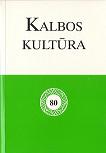Svetimžodžiai, politika ir teisės aktai
Foreign words, politics and legal acts
Author(s): Pranas KniūkštaSubject(s): Language and Literature Studies
Published by: Lietuvių Kalbos Institutas
Keywords: Loanword; language purification; language policy
Summary/Abstract: Loan words first spread at the outset of the Lithuanian written tradition. There were no attempts to stop them; from written sources they easily spread into spoken language. Their critical evaluation was only noticed during the years of national revival. As a result, foreign words were soon ousted from the standard language. Such attempts of language purists were supported by people working in other areas of culture. During the years of Lithuania’s independence between the two world wars the language purification tendency has spread into other strata of society and became part of cultural policy. The policy was implemented and maintained by educational and moral measures. During the years of Soviet power the attitude of the years of independence was preserved, and loan words were then equally unacceptable. However, a new wave of foreign words came from Russian. No one was allowed to openly denounce them; they were to be corrected secretly and quietly. The substitution of Russian loan words by Lithuanian equivalents was a form of national defence. Presently, foreign words come into Lithuanian from the West, mainly from English. They spread with hardly any opposition, since they are not concerned with compulsion or violence. Some linguists of younger generation are also rather indifferent to them. This specific situation requires that foreign words should not be treated in the same way. Some administrative measures have to be introduced and legal acts adopted.
Journal: Bendrinė kalba (iki 2014 metų – Kalbos kultūra)
- Issue Year: 2007
- Issue No: 80
- Page Range: 24-31
- Page Count: 8
- Language: Lithuanian

